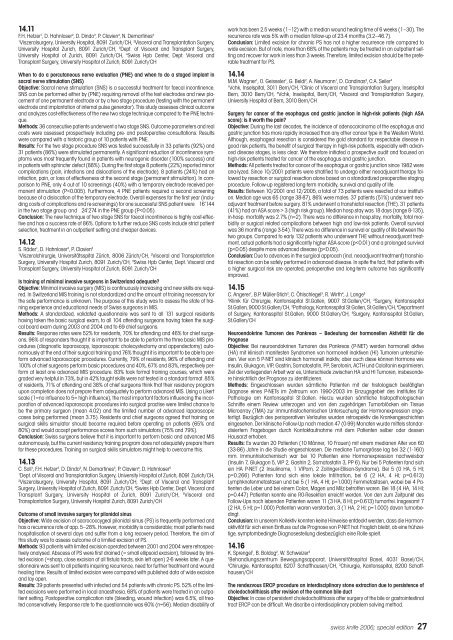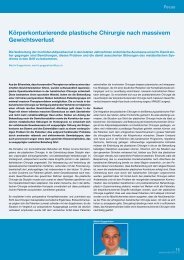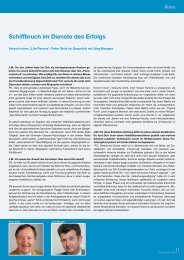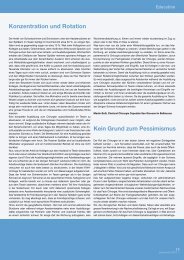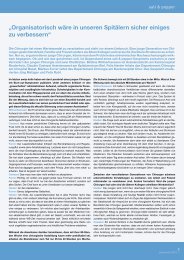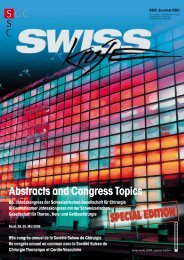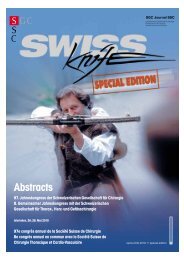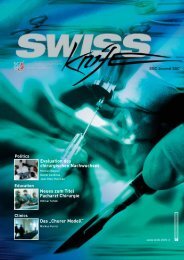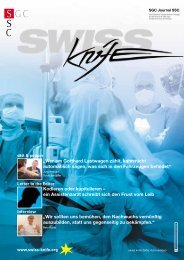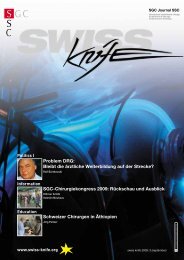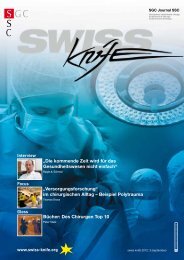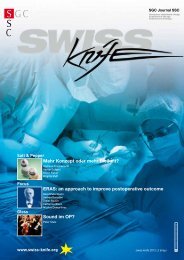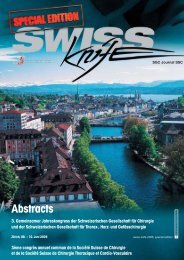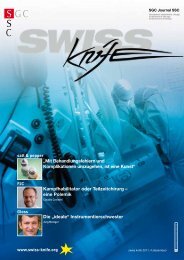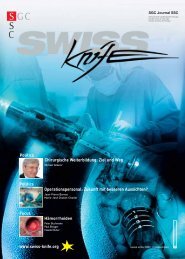Abstracts 4. Gemeinsamer Jahreskongress der ... - SWISS KNIFE
Abstracts 4. Gemeinsamer Jahreskongress der ... - SWISS KNIFE
Abstracts 4. Gemeinsamer Jahreskongress der ... - SWISS KNIFE
Create successful ePaper yourself
Turn your PDF publications into a flip-book with our unique Google optimized e-Paper software.
swissknife spezial 06 12.06.2006 13:39 Uhr Seite 27<br />
1<strong>4.</strong>11<br />
F.H. Hetzer 1 , D. Hahnloser 2 , D. Dindo 3 , P. Clavien 4 , N. Demartines 3<br />
1 Viszeralsurgery, University Hospital, 8091 Zurich/CH, 2 Visceral and Transplantation Surgery,<br />
University Hospital Zurich, 8091 Zurich/CH, 3 Dept. of Visceral and Transplant Surgery,<br />
University Hospital of Zurich, 8091 Zurich/CH, 4 Swiss Hpb Center, Dept. Visceral and<br />
Transplant Surgery, University Hospital of Zurich, 8091 Zurich/CH<br />
When to do a percutaneous nerve evaluation (PNE) and when to do a staged implant in<br />
sacral nerve stimulation (SNS)<br />
Objective: Sacral nerve stimulation (SNS) is a successful treatment for faecal incontinence.<br />
SNS can be performed either by (PNE) requiring removal of the test electrodes and new placement<br />
of one permanent electrode or by a two stage procedure (testing with the permanent<br />
electrode and implantation of internal pulse generator). This study assesses clinical outcome<br />
and analyzes cost-effectiveness of the new two stage technique compared to the PNE technique.<br />
Methods: 36 consecutive patients un<strong>der</strong>went a two stage SNS. Outcome parameters and real<br />
costs were assessed prospectively including pre- and postoperative consultations. Results<br />
were compared with a historic group of 10 patients with PNE.<br />
Results: For the two stage procedure SNS was tested successfully in 33 patients (92%) and<br />
31 patients (86%) were stimulated permanently. A significant reduction of incontinence symptoms<br />
was most frequently found in patients with neurogenic disor<strong>der</strong> (100% success) and<br />
in patients with sphincter defect (88%). During the first stage 8 patients (22%) reported minor<br />
complications (pain, infections and dislocations of the electrode). 8 patients (24%) had an<br />
infection, pain, or loss of effectiveness at the second stage (permanent stimulation). In comparison<br />
to PNE, only 4 out of 10 screenings (40%) with a temporary electrode received permanent<br />
stimulation (P


